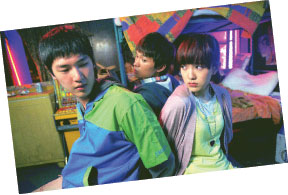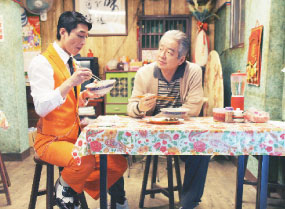Hello to a Taiwanese trend that's welcome to stick around
Updated: 2010-08-21 06:30
By Elizabeth Kerr(HK Edition)
|
|||||||
|
Susie (Amber Kuo) does her best to win lovesick Kai's (Jack Yao) affection in the charming genre mash-up Au Revoir Taipei. Provided to China Daily |
First-time helmer Arvin Chen mixes his genres in box office winner, reports Elizabeth Kerr.
Recession or not, cinema around the world is in a bit of a spot. Ticket prices are rising, quality seems to be nose-diving and audiences are staying home to watch excellent television (because those 3D glasses cause headaches).
What's a filmmaker to do?
The solution for Hong Kong's troubled film industry seems to be putting all its eggs into the mainland co-production basket. On one side of the fence is the argument that Hong Kong cinema is losing, or has already lost, its local flavor. On the other is the notion that, "Hey, films are getting made, aren't they?" Such is life in the movie world early in the 21st century.
Cobbling together funds for increasingly pricey films for dwindling audiences isn't a problem specific to Hong Kong. Hollywood is famous for bloated budgets and desperate gimmicks and the world's biggest studios - with the deepest pockets - are also scrambling to create coalition financing. Hearing that Paramount and Warner Bros. are partnering on Movie A and Fox and Universal working together on Movie B is not that shocking anymore.
Unlike the mainland, where cinema on every level is booming, Taiwan has a relatively small industry that can't offer much in the way of infrastructure for international co-producers.
Talent isn't an issue, but it's a physically small space with limited variety in topography and cities that were rushed through construction in the post-war years.
|
Love leads Kai, Gao, and Susie (from left Jack Yao, Paul Chiang, Amber Kuo) to get in over their heads on night in Au Revoir Taipei. |
As neighbors, you and I may be able to spot Taipei in a photo, but for anyone else it looks like any other sprawling Asian megalopolis. Even Hong Kong has a few things going for it that Taiwan as a location can't compete with: It doesn't get much more urban than Hong Kong, and we speak English.
So Taiwan is left alone to buoy its own industry and make a mark. To that end, there's been a noticeable shift in the kind of films coming out of Taiwan in the last couple of years.
Until recently more often than not when you uttered the phrase "Taiwanese cinema", the words somnolent, dour, and monotonous usually came up. The Hou Hsiao Hsien/Tsai Ming-liang aesthetic took over for the majority of the 1980s and '90s, and young filmmakers that followed mimicked their styles. Themes and content (though there was a shift toward urban despair and identity crises among young filmmakers) became almost standardized for much of the last two decades and it even turned off viewers at home.
The high water mark in the recent attitude adjustment came when Cape No. 7 scored domestic box hit status. Cape was a trifle; a fluffy, romantic, musical and decidedly mainstream bit of filmmaking that rivaled anything from Hollywood for the level of calculation that went into making it. It was a revelation for Taiwanese viewers, who had all but given up seeing anything at home that wasn't aggressively artistic and obtuse.
Then came Monga, an old-fashioned coming-of-age gangster melodrama - another hit. Together they proved that Taiwan's domestic industry could indeed cater to the masses with easily digested entertainments.
In that light comes Chinese-American director Arvin Chen's ridiculously enjoyable debut, Au Revoir Taipei. Over the course of one night, lovesick Kai (Jack Yao) prepares to leave dreaded Taipei and a dreary job slinging noodles at the family restaurant for Paris and the woman who jilted him. At first he's alone, but before you know it he's neck-deep in a gang conspiracy along with his equally lovesick buddy Gao (Paul Chiang) and the bookshop clerk who kinda sorta likes Kai, Susie (Amber Kuo).
But that's just the romantic-dramedy half of the film. Chen's first effort is a cheeky blend of romance and caper comedy (true, that's been done before) shot like a funky latter day noir film. Both executive producer Wim Wenders (Wings of Desire, Buena Vista Social Club) and Chen's mentor Edward Yang's (Yi Yi, A Brighter Summer Day) influences can be felt in many a frame, but that doesn't mean Chen has no clear vision of his own. The story weaves together several seemingly random strands, but never loses focus, helped partially by Chen's decision to set the action on one night.
|
Aspiring gangster Hong (Lawrence Ko, left) and his boss Brother Bao (Frankie Gao) ruminate on a missing package in Arvin Chen's debut Au Revoir Taipei. |
The second half of the film involves ambitious, if slightly bumbling wannabe thug Hong (Lawrence Ho) and his band of merry men as they try and make amends for a failed heist. There's also a hunt for a mysterious package Kai was supposed to deliver for gangster boss Bao (Frankie Gao). Into the mix comes broken-hearted cop Ji-yong (Joseph Chang), and a farcical adventure that exploits Taipei's rabbit warren streets and penchant for food at all hours soon follows.
Au Revoir Taipei is very much a Taiwanese film, but it's "off" just enough that it feels like something completely new.
Indie cinematographer Michael Fimognari's evocative nocturnal images are drenched in a dizzying array of color (including the vibrant orange gang uniform) that lends the film its hyper-real tone, underscored by a perfect - but never intrusive - jazzy score.
As events swirl around Kai, comical and crazy as they may be, he remains the beating heart of the story. The closer it gets to dawn, the more Kai realizes he may not have to run off to Paris for either excitement or love. The idea that fulfilling one's desires can be accomplished at home isn't new either, but Chen uses this simple theme as the framework upon which to build a tale about his charming, bizarre, baffling, and appealing characters.
The young cast is strong across the board, with pop singer Kuo as the flailing bookshop worker with a crush particularly notable. She conveys a kind of understated and conflicted confidence that is rare in screen women in Asia.
Chen directs with a surprisingly sure hand that belies his experience (he did, however, win a Silver Bear at Berlin for his first short, Mei) that points to a bright future. Au Revoir Taipei is a tight, well-constructed crowd-pleaser with a simple message. If this is the one industry trend that's going to stick, I say bring it on. There's been enough muted misery in Taiwan. It's time to have some fun.
Au Revoir Taipei opened in Hong Kong Thursday.
(HK Edition 08/21/2010 page3)


